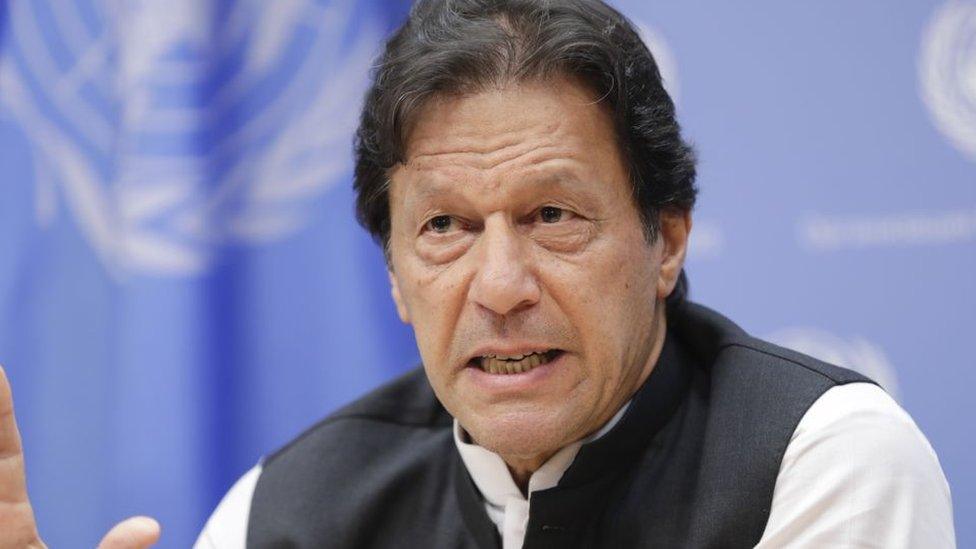Pakistan opposition seeks end to Imran Khan's 'puppet' rule
- Published
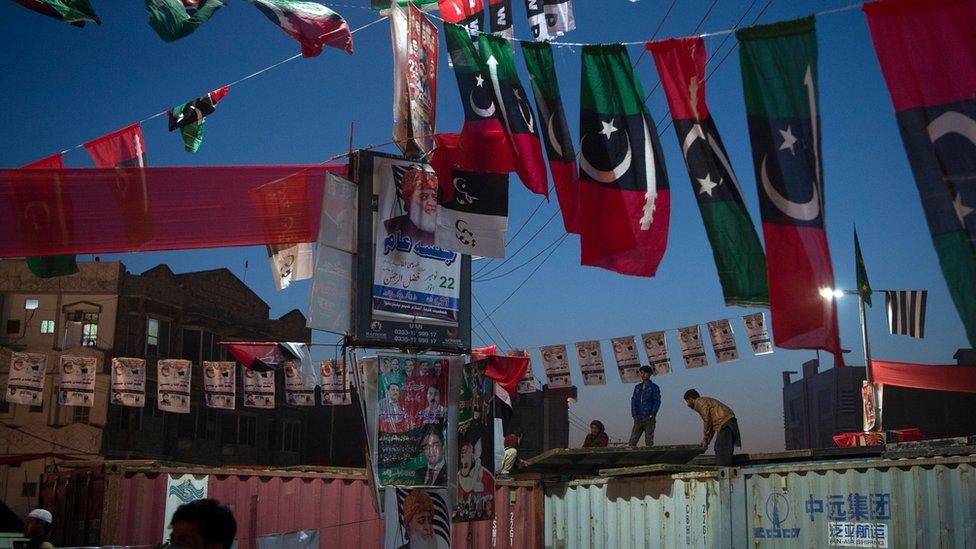
The high-profile protest is being held in the city of Peshawar
Opposition parties in Pakistan are keeping up the pressure on Imran Khan, holding a series of mass protests against his government.
They allege the prime minister came to power in rigged 2018 elections backed by the military.
Protesters demonstrated in the city of Peshawar on Sunday, despite a government threat to ban gatherings to curb rising coronavirus cases.
The PM, who came to power on an anti-corruption platform, has said the campaign is aimed at blackmailing him to drop corruption cases against opposition leaders.
Pakistan's powerful military denies interfering in politics and Mr Khan rejects claims it helped him win.
The next general election is not due until 2023.
Who is behind the rallies?
The Pakistan Democratic Movement (PDM) has held a series of mass demonstrations since 16 October. Its members range from a right-wing religious group to centrist and left-of-centre mainstream parties as well as secular nationalists.
Rallies have taken place in three of the country's four provinces - Punjab, Sindh and Balochistan. Sunday's was the first the PDM has held in Khyber Pakhtunkhwa province. The rally was attended by senior opposition political leaders, including PDM chief Maulana Fazlur Rehman, Pakistan Muslim League-Nawaz (PML-N) vice-president Maryam Nawaz Sharif, and Pakistan People's Party (PPP) chairman Bilawal Bhutto Zardari.
The opposition parties say they want to overthrow what they allege is an "unrepresentative" leadership, accusing Mr Khan's government of putting pressure on the judiciary and mismanaging the economy.
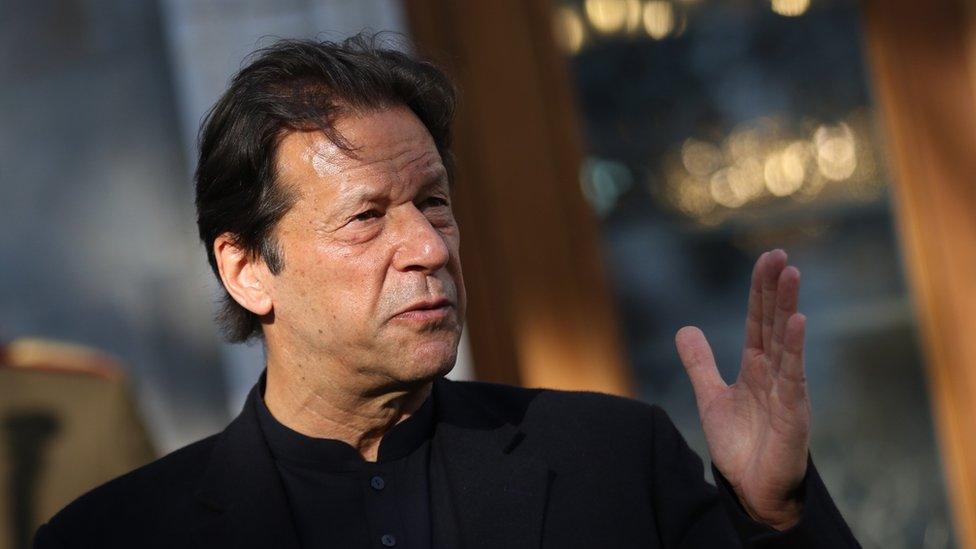
Protesters allege that Prime Minister Imran Khan came to power in a rigged election
The PDM is the latest of a number of political coalitions which say they aim to restore "real" democracy in Pakistan's perpetual civil-military conflict. This one is boosted by the return of former Prime Minister Nawaz Sharif to public politics.
In an unprecedented move for a former prime minister, Mr Sharif directly criticised two top military officials, General Qamar Javed Bajwa, the chief of the army, and Lt Gen Faiz Hameed, the chief of military intelligence agency the ISI. He alleged that they were responsible for Pakistan's political and economic woes.
What do the rallies tell us?
The rallies held so far in Gujranwala, Karachi and Quetta took place despite road blocks and even some arrests by the authorities. Mr Sharif's son-in-law, Safdar Awan, was arrested at his hotel room early in the morning after the Karachi rally on 19 October.
The arrest caused embarrassment to both the government and the military after footage of the raid emerged showing security personnel breaking into Mr Awan's room while he was asleep with his wife.
It was reported later that hours before the raid, the police chief of Sindh, of which Karachi is the capital, was taken from his residence to the offices of an intelligence service and forced to sign Mr Awan's arrest orders.
Subsequently, the entire officer cadre of Sindh police applied for "protest leave", which they postponed when the army chief announced an in-house inquiry into the police chief's alleged kidnapping.
But although the army chief ordered the removal of certain ISI and military officials, no visible action has been taken against them yet. The authorities have also put pressure on the media to censor some of the speeches at the rallies.
During live coverage of protests, television channels invariably cut back to the studios when Mr Sharif begins his video-link address from London, or when nationalist leaders like Mohsin Dawar take to the rostrum.
These leaders have been criticising the army, accusing it of enforced disappearances, human rights abuses, and controlling the Khan government from behind the scenes.
Was the election rigged?
Pre-election surveys in 2018 had forecast a clear majority for the PML-N, but Imran Khan's PTI ended up winning by a thin margin.
Mr Khan and his team say they won because the electorate was fed up with corruption under previous governments run by Mr Sharif's PML-N party and former President Asif Zardari's PPP.
But independent observers raised questions about the integrity of the process in the run up to election day.
The Human Rights Commission of Pakistan (HRCP) described the build up, external as "the dirtiest, thoroughly micromanaged, and most intensively fought exercise in the country's history". There were widespread allegations that the military was attempting to swing the election in Mr Khan's favour, including claims that intelligence agencies intimidated opposition politicians into switching to his party.
International observers also raised concerns. Michael Gahler, the chief of the European Union election observer mission to Pakistan for the vote, external, said the mission had observed "systematic attempts to undermine the ruling party" ahead of the vote, "through cases of corruption, contempt of court and terrorist charges against its leaders and candidates".
The power and influence of the Pakistani army
The HRCP also said it was concerned by the presence of security forces at polling stations, and alleged that some polling stations had been taken over by the military after the voting had finished and poll workers dismissed from the locations.
"What happened after the close of polling had no precedent in Pakistan's election history," the HRCP report said.
The EU observers reported similar findings, saying they "noted army personnel inside all polling stations observed, and reported a few cases where they interfered in polling proceedings or directed party agents to stay outside the polling stations".
"Counting was sometimes problematic, with EU observers assessing as positive the counting process in only two thirds of observations," the EU report concluded.
Mr Gahler said the mission had not observed any direct election rigging on polling day, but concluded there was "a lack of equality of opportunity" among the parties and the "overall process was not as good as 2013" - referring to the previous election.
Since election day, allegations of human rights abuses have mounted against state agencies. Media censorship has increased and journalists who paint the military in a negative light have faced threats.
Senator Shibili Faaraz, the government minister for information and broadcasting, said in a statement there was "no civil-military rift".
"As for the 2018 elections, PTI came to power on the support and votes of the people of Pakistan. It's really as simple as that and it is time for the BBC and other foreign media outlets to realise this," he said.
What happens now?
No-one can be sure where the current protest movement will lead. But everyone knows that the battle is between the politicians and the military, with Prime Minister Imran Khan seen by his opponents as an appendage of the latter.
The opposition rallies have not only questioned the legitimacy of his government, but have also thrown a direct challenge to the heads of the army and the ISI, in a country with a history of civil-military tension and coups.
The last popular uprising was in 2008, when General Pervez Musharraf was ousted and the constitution restored.
Since then, the country has witnessed what analysts have described as a "hybrid military regime" in 2018.
Ayesha Siddiqa, an expert on the Pakistani military, believes that the opposition's recent protests have begun to make the chiefs of the army and the ISI look weak., external
In order to ensure the supremacy of the constitution, members of the opposition alliance will need to develop a "core expertise that would make a cogent civil-military dialogue and a pushback possible", Siddiqa said.
In addition, she said, they would "have to be willing to re-arrange overall socio-political and socio-economic relations beyond winning elections".
The coming weeks and months will show if the new opposition alliance can achieve their goals.
Update 24 November 2020: This article was updated to clarify the sourcing for a reference to the "dirtiest" election in Pakistan's history, and to add additional references to an EU report on the integrity of the 2018 elections. A statement from Pakistan's minister for information and broadcasting was also added, in response to the original article.
- Published20 November 2020
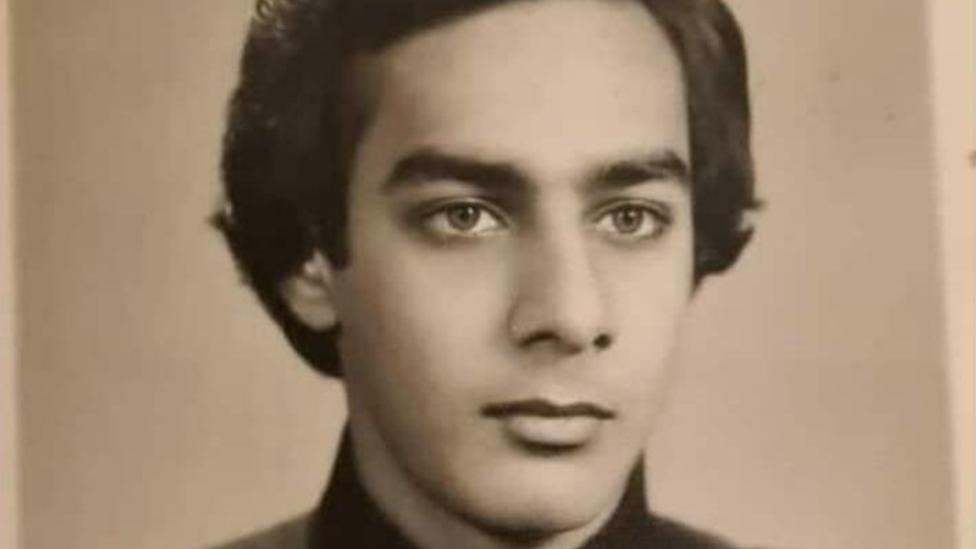
- Published23 October 2020
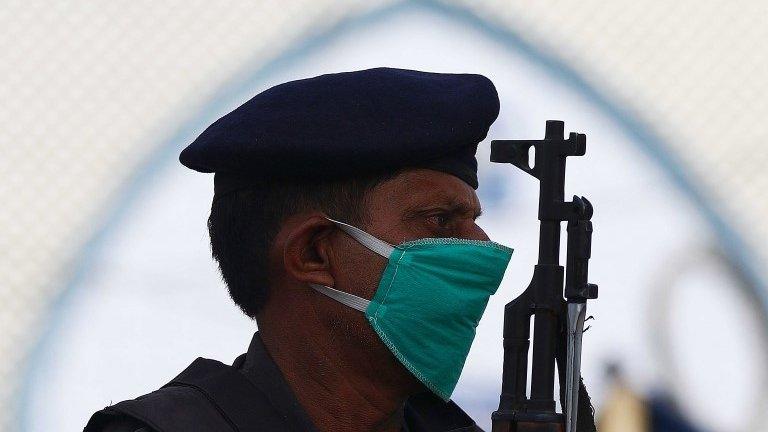
- Published1 February 2024
